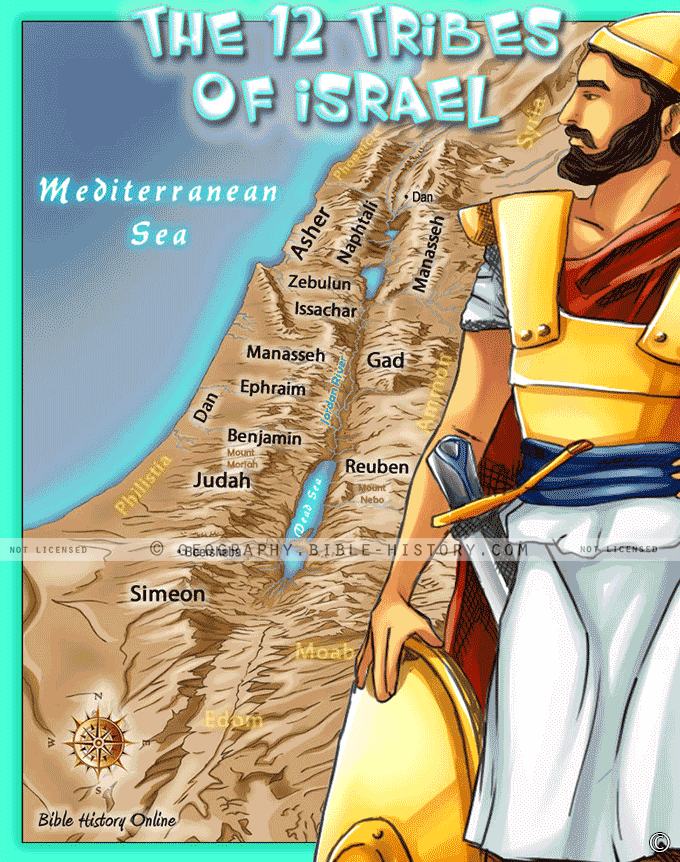
The story of the 12 Tribes of Israel is a captivating narrative that weaves together history, identity, and destiny. From the patriarch Jacob, who fathered these tribes, to the distinct heritage and blessings bestowed upon each, this saga spans generations, revealing the tapestry of a nation's growth, struggles, and ultimate unity. As we delve into the lives of these tribes, we uncover a profound legacy that continues to resonate with cultural and spiritual significance.
Origins and Patriarchal Blessing
The journey of the 12 Tribes begins with Jacob, later known as Israel, who fathered these tribes through his sons. The blessings he bestowed upon each son, recorded in the book of Genesis, shaped their destinies and roles within the nation. This patriarchal blessing marked the beginning of a diverse lineage that would become the foundation of the nation of Israel.
Tribal Identity and Unique Blessings
Each tribe carried its own identity and blessings, reflecting the distinctive qualities attributed to them. From leadership to craftsmanship, courage to wisdom, the tribes' characteristics were intertwined with the narratives of their ancestors. These unique attributes contributed to the multifaceted nature of the Israelite nation, showcasing the importance of unity within diversity.
Land Allotments and Territories
Upon entering the Promised Land, the 12 Tribes were allotted territories that corresponded with the blessings they received. These tribal territories not only shaped the geographical landscape of the nation but also played a role in cultivating tribal identity and cohesion. The Land of Israel became a living embodiment of the promises made to the patriarchs, a testament to the unfolding divine plan.
Unity and Division
While the 12 Tribes shared a common ancestry, their history also marked moments of division and conflict. The division of the kingdom into Israel and Judah, as well as the eventual dispersal of the Northern Kingdom, illustrate the challenges faced by a nation striving to maintain unity amidst diversity. Yet, the underlying thread of heritage and shared legacy remained resilient.
Spiritual and Cultural Significance
The 12 Tribes of Israel are not merely historical entities; they hold spiritual and cultural significance that resonates to this day. Their stories, blessings, and struggles symbolize themes of unity, diversity, and the quest for a shared purpose. These tribes continue to serve as a unifying symbol for Jews and those who engage with the Abrahamic faiths, offering insights into the dynamics of identity, heritage, and destiny.
The story of the 12 Tribes of Israel is an exploration of identity, heritage, and the interplay between unity and diversity. From the patriarchal blessings that set their paths in motion to the enduring legacy that defines a nation, these tribes showcase the intricate layers that form the fabric of history. As we delve into their lives, we gain insights into the complexities of nation-building, the importance of unity amidst differences, and the enduring power of a shared legacy that has shaped cultures, faiths, and societies for millennia.
Blank Topo Map of The World
Abraham’s Journey
The Captivity of Judah (586-516 B.C.)
The Fall of Judah 586 B.C.
The Northern Kingdom of Israel
The Southern Kingdom of Judah
The Divided Kingdom
The Fertile Crescent
Ur of the Chaldees
Shechem in Old Testament Times
Prophets, Kings, and Nations
Jesus Last Passover
New Testament Israel
New Testament Places
Old Testament Israel
Provinces of the Roman Empire
Israel during David’s Kingdom
David’s Kingdom
Cities of the New Testament 4
Cities of the New Testament 3
Cities of the New Testament 2
Mediterranean Sea
Cities of the New Testament
First Century Jerusalem
Empire of David and Solomon
David’s Kingdom
Israel Under Rehoboam
Ophir and Tarshish
The Period of the Kings
Ramoth Gilead
Samaria
Solomon’s Temple
Zarephath and MT Carmel
Jabesh Gilead and Tribes
Judah in the Time of David
Kingdom of Saul
Kirjath Jearim
Michmash
Mount Gilboa in the Time of David
Nob Davids Flight
Shiloh
Israel and Judah
Assyrian Empire Under Esarhaddon
Assyrian Empire Under Sennacherib
Captivity of 10 Tribes
Events in 2 Kings
The Khabur River
Israel and Syria
Captives From Judah
Kingdom of Jeroboam
Mesha’s Kingdom
Pharaoh Necho Battles King Josiah at Megiddo
Babylonian, Mede and Persian Empires
Samaria and Nearby Territories
Syria at its Height
Hebron
Mahanaim
1949 Map of Israel With Boundaries
First & Second Journeys of Paul
Journeys of the Apostles
Paul’s Third Missionary Journey
Saul’s Journey to Damascus and Arabia
Paul’s Final Visits
Paul’s 1st Missionary Journey
Paul’s 2nd Missionary Journey
Paul’s 3rd Missionary Journey
Paul’s Voyage to Rome
Phillip Journeys to Samaria and Gaza
Judah at the Time of Amos
Empire of Alexander the Great
Israel Under the Maccabees
Galilee During Maccabees
Idumea Intertestamental Period
Kingdom of the Ptolemies
Kingdom of the Seleucids
Ptolemaic Egypt Seleucid Asia
The Roman World
Kingdom of Ptolemies and Seleucids
The World During the 6TH Century BC
Mount Horeb
The Red Sea
The Exodus
Ezra’s Journey to Restore Jerusalem
Israel and Judah During Hosea’s Time
The Ancient World
Canaan During the Time of Abraham
The City of Shechem
Supposed Location of the Garden of Eden
The Land of Israel in Genesis
The Jordan River
The Kingdom of Nimrod
Mount Ararat and Mesopotamia
The Descendants
Sodom and Gomorrah
The Kingdom of Egypt
The Hamites
The Kingdom of the Hittites
Ur of the Chaldees
Judah at the Time of Haggai
Jesus Passes Through Samaria
